Making Dragon Age: Inquisition
- Transfer
It has been several months since the release of the game, but I fully admit that you have not played or have not passed Dragon Age: Inquisition.
Before you read the article, we recommend that you complete this game.
To say that this article is a spoiler is to say nothing. This is the analysis of the game as a whole: from actions that affect the development of the plot, to the very, smallest details. Naturally, it’s worth playing Dragon Age: Inquisition: this game last year deservedly won the award in the category of Best Single Player and has one of the most exciting, unusual and fantastic stories that we saw in PC games.

First of all, I want to note why I added the translation to the hubs Development and Testing of games. This article contains a lot of theses that will help both developers and testers to look at the game plot and cases in a slightly different way. After all, BioWare really makes unique products.
Once again: do not read the article if you do not want to know the denouement of the plot.
Only a few developers can say that they fully understand the style of the game. Perhaps a couple of years ago you could say that this was just a “single shooter”, but now the title of “best single shooter” has deservedly passed to the brainchild of MachineGames. You could call Bethesda RPG, noting an interesting mixture of research, storytelling, and controlled freedom. However, most likely, you will understand what I mean if I say the words “BioWare RPG”. In the 17 years that led to the creation of Dragon Age: Inquisition last year, this Canadian studio has created the foundation for role-playing video games, which no other studio can boast.
Companion characters, plurality of choices and verified plots, the ability to import “save” files are an integral part of this structure. Philosophical and practical player orientation, flexible functionality allow BioWare to combine personality and fiction. In my opinion, this is what distinguishes the BioWare RPG from other RPGs from a technical point of view. You can also talk about the genre, and here it is quite relevant: sensations. In the 90s, id Software determined the sensations of shooters, the essence of which is crazy catharsis. Bethesda was drawn to change and travel after the lines of “See this mountain?” You can go there, ”and she turned them into a genre. BioWare have achieved something similar, but in this case, developers are more likely to click on the emotional rather than the physical.
If you understand what I mean when I say “BioWare RPG” - I think you experienced these “feelings”.
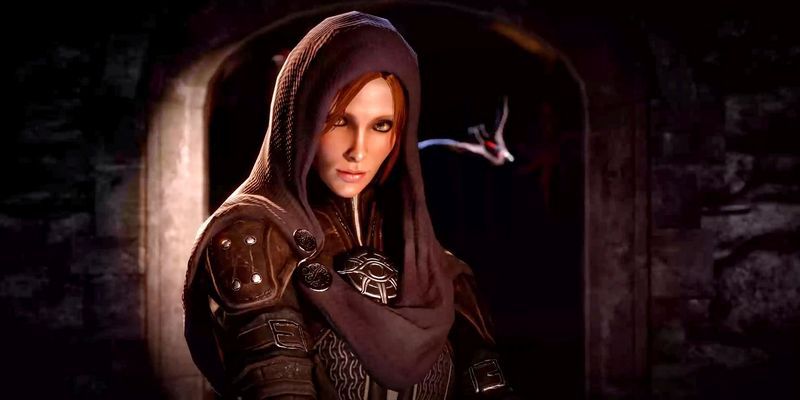
In RPG, unlike other games, you are guided both by your head and heart - in fact, I would say that this is the best of the possible definitions of the RPG genre in a world where there is a character development system everywhere. BioWare has done much more than other major developers in terms of studying the “heart” in this equation, and as a result of these efforts, it has received a huge number of loyal fans, whose work is sometimes very inspiring. And, let's be honest, even angry reviews sometimes give the very necessary impetus for development. One way or another, BioWare does not leave people indifferent.
For many years I have been a fan of BioWare. I kept waiting for other companies to start copying their style, directions, accuracy of character development - but this never happened. Only Obsidian and InXile can somehow compare with this studio in terms of flexibility in developing various RPG styles, but they are connected with BioWare by one common link - Black Isle Studios. Since I was given the opportunity to talk with the Dragon Age: Inquisition development team, what I wanted most to understand was how BioWare manages to maintain its distinctive style. I suspect that their characteristic features are in no way connected with technical limitations, but are more related to certain cultural values and priorities - this is where I will start.
Dragon Age script writer Cheryl Chi says about the creative process at BioWare. “When you say“ remember the player, ”you should try to put yourself in the shoes of different types of players,” adds Patrick Wicks, who was recently appointed lead writer for the Dragon Age series. “You need to not just think about gay players and women. You should consider such types as “advanced player”, “player who cares how the game ends”, “player who cares about the plot”. You must put yourself in the shoes of players with a different mentality. ”
Former lead author David Geider adds: “You also need to remember the balance of what we want to tell and what we can tell our fans. It is necessary to approach this very responsibly. Some developers may, sometimes unintentionally, narrow the potential audience of their game. This happens when you do not feel part of the game, when you get the feeling that "this game is not for you." We create products for a wide audience, and all we want to do is attract people to our game. ” From a conversation with the team of creators of Dragon Age, it becomes clear that this view is shared by all team members. Considering the situation from different perspectives is the very thing that connects the work of the team and the plot presented in the game itself.
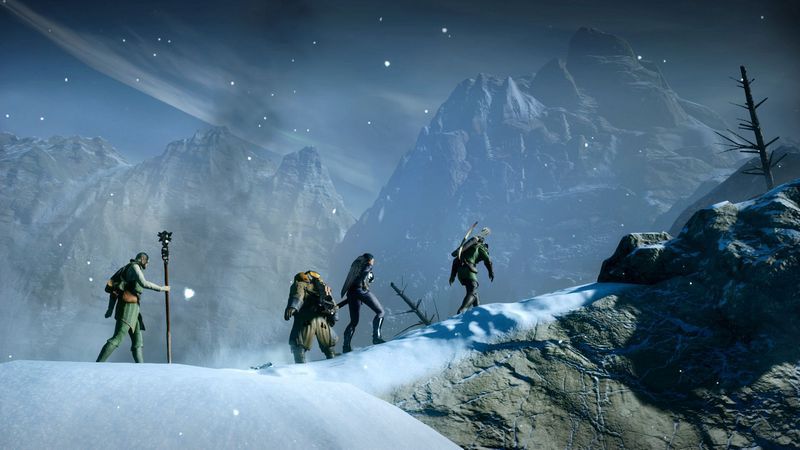
“I’m always preoccupied with the thought that our“ fans ”exist somewhere, let's call them that, and they believe that we can’t concentrate and get involved in developing some serious fantastic moments that must be there,” says Geider. “Let me explain: we, as a team, at some point just sit down and say that the plot is not fully developed. How will a girl player take it? Or a gay player? Or a male player of a traditional orientation? How can people interpret the plot? After all, we are responsible for this. ”
The concept of social responsibility of game developers at the present time, unfortunately, is limited only to the political component. It should not be like that. Practical fact: the quality of the game is as important to the user as the technical component. You can see this by looking at how the Dragon Age development team reaches and exceeds its own standards: the Inqisition series is incredibly successful in terms of working out even the smallest nuances. The player can create his Inquisitor exactly as he wants, and his character will be one of many other heroes who will have a variety of worldviews, political beliefs and sexual preferences. This game, however, can be a problem for one type of player, whom Wicks calls the “finalists,” those who value the moment the game is complete. The open world of the Inquisition series is combined with numerous quests. It is necessary to “season” the games, and not to consider them simply as “something that needs to be passed”. PCG News Editor Phil Savage and I have been persuading our editor Samuel to leave the Inner Lands for two months and give up bear claw hunting for two months. ”
“To some extent, we have missed the interest in completing the action,” says Mike Laidlaw, creative director of the Dragon Age series. “For the“ finalists, ”it was important that you could destroy everything that you achieved. I look at it, and, you know, what I’m thinking about? That this will be a good lesson for us. ”
Discussing the issue of the “Prisoners of the Inner Lands”, Leydlow connects it with the problem that was earlier: playing the early RPGs from BioWare, the players got bored because they had to choose each option to continue the dialogue in order to be able to progress. “The most interesting thing happened when we switched to the communication wheel,” he says. “We observed two types of reactions: some players were upset, it seemed to them that the game was cut back. But there were other players who, looking at the “explore” option, thought: “Oh, cool, you can skip conversations!”.
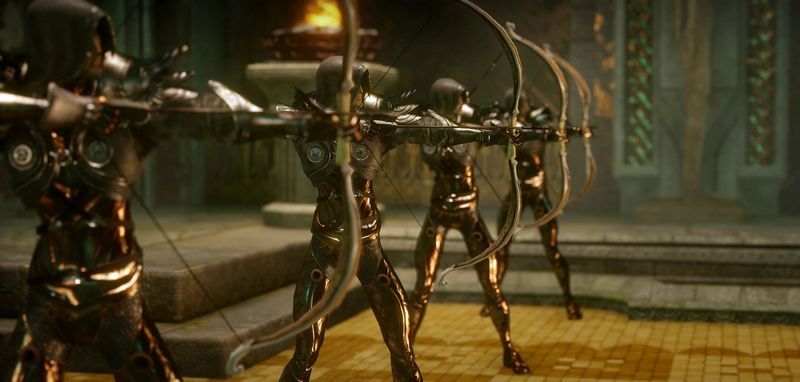
BioWare Studio often shifts the responsibility for the development of the game to the player, and in this case the question of proportions arises: from the option “the game gives the player too few clear instructions for the development of the plot” to “the game dictates the player every step”. It is important to think over everything here. But the player should be able to ruin all his progress, if necessary for something. The team’s job is to find the right balance, and not to bring the player to the perfect result. “The option to“ explore ”can ruin the development of the plot,” says Geider, “therefore, basically, you need to stick to the plot and at the same time find the moments when using this option will be appropriate.”
For Inquisition, the Dragon Age development team has developed a new conversation mechanic in order to transmit information that is usually “buried” in “research”. The ability to display the wheel of communication in an open world allows the player to get additional information if he has such a desire, or completely get away from communication. It all depends on the player, and if the plot somehow changes, then this is the player’s decision. I think this is the flip side of BioWare's social responsibility: its desire to ask the player to “complete” what the plot intended, creating new tools that allow it to be implemented.
This is revealed in Inquisition by introducing a new set of emotional response options that appear after key events: now the player can not only be happy, angry or sad - he can be courageous, bewildered, upset, and so on. “We always want to give the player the ability to respond to everything that happened in the game,” says Geider. “In order for the player to realize what happened, as well as for the game to understand what happened.”
“In past games, we forced reaction or avoided the manifestation of emotions,” adds Wicks. “The reaction wheel allows you to select the desired reaction - anger, sadness, or, if the player does not attach any importance to this, you can choose something like“ spit. MOVING ON. ”
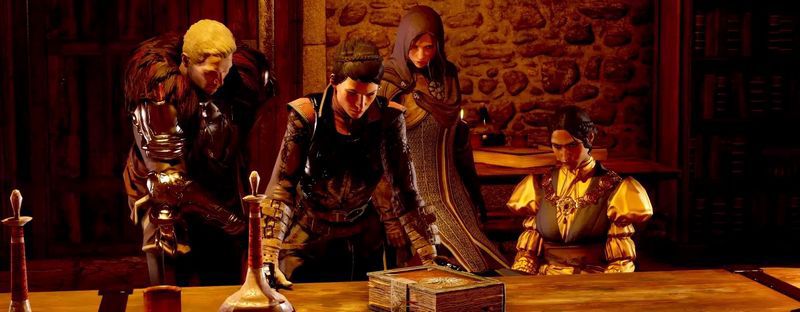
Gader continues: “We ask the player - do you have any emotions ... feelings, after something happened? And the player can switch his mood, choose any emotion: sadness, joy, anger, etc. ”
“Instead of saying something,” Wicks adds.
These answers do not greatly affect the plot outside the conversation, but that is not the point. The point is to let the player feel the result of what happened, even if they cannot change anything. This is a realistic way of including emotions in the game, as well as a certain distinction between a situation where it is possible to change something, and a situation in which nothing can be changed, you just need to accept it. But, of course, this line is much thinner than, say, its implementation in the Mass Effect series.
It seems to me that the complaints and petitions that followed the pessimistic initial completion of Mass Effect are nothing more than the refusal of some players to fulfill their part of the “deal”. Instead of recognizing BioWare’s right to show that bad things happen to good people, many fans have claimed they are eligible for a happy ending. I'm interested in the Dragon Age development team, do they think that they had the opportunity to confront the players and defend the possibility of some kind of tragedy in this case too? For example, all magicians and elves remain, but they are freed from all the prejudices that apply to them in the world of Thedas.
“I can’t speak for the rest of the authors, but I personally received negative reviews for everything where I limited the choice of players based on the player’s race or his past,” says Wicks. “I noticed a more positive reaction when I gave players of any race and any experience access to bonus content. So far we have not made a game where we wanted to show and give a sense of how people who are discriminated against feel. We wanted to avoid creating situations where, for example, people can do something, but elves do not. This, of course, would be realistic, but I don’t think that our players want this. ”
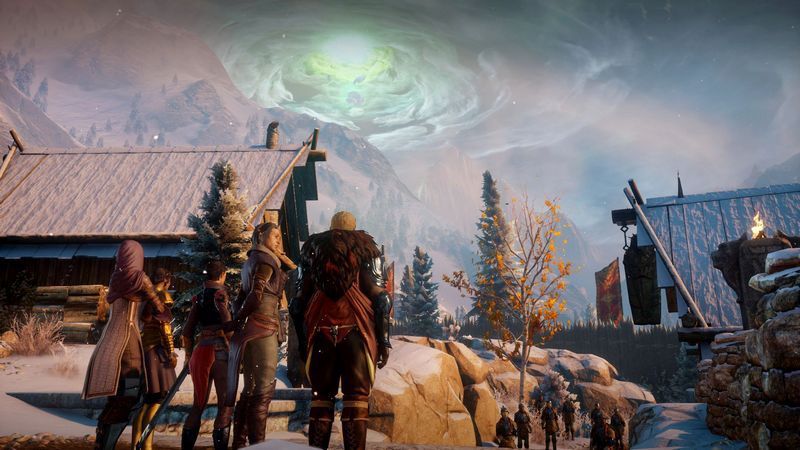
“Sometimes we do it,” interrupts Geider. “For example, characters who are not human beings cannot marry Alistair.”
“My starting point here is the choice you make at the end of the Origins part,” says Wicks. "Bonus - Become Queen Alistair."
“There is a difference between restricting a player’s choice and how the world responds to your decisions,” says Geider. “However, of course, there are situations where the Dragon Age team restricts players in order to increase tension.”
“Cheryl can tell you about this,” Vicks says, “she killed Hawke’s mother. It seemed like something terrible, but I will never launch a petition in order to save her. "
“We do this out of necessity,” Chi says.
“This is the fine line between the fact that you add drama to the plot and that you kick the player just because you can do it,” adds Geider. “I don’t know if we always did everything successfully, but this is part of the plot - you have to report bad news.”
I am fascinated by the respect and attention that exists between BioWare developers and players. Some bias occurred in ensuring the love claims of players during the transition from Dragon Age 2 to Dragon Age: Inquisition. This is another area of contention for fans of this game: the most ardent supporters of BioWare find deep meaning in this, while some users complain that the developer is trying to demonstrate progressive views at their expense. In Dragon Age 2, Sebastian's companion was available as a potential target for love for both female characters and men. In the Inquisition part, companions have more specific sexual preferences, which are formed on the basis of their life experience or views. In some ways, players are more limited, but these restrictions give the relationship more importance.
“I see characters in Dragon Age 2 as bisexual,” he says. “It seems to me that there is a tendency to hide bisexuality, to make sexuality“ invisible ”, and I don’t really like it. When we started creating the Inquisition part, I looked at the reviews on Dragon Age 2, and it turned out that everything was “too good”, a bit unrealistic. I do not want to abandon the idea of bisexuality or pansexuality, but still you can not create characters on the principle of "all for all." It doesn’t work like that. ”

“We had a desire to create characters that would be traditional and non-traditional, as well as bisexual,” continues Leidlow. “We wanted to make sure that it would be possible to create different love stories with a fresh plot, and not just“ I love you ”,“ I love you too ”- kissed. In addition, we wanted to move away from the predictable scenario in which we previously created our games. Now the plot is more vital. ”
Over time, when creating RPGs, BioWare moved away from "simulation" in the conventional sense. The developers began to create difficult social situations for the player, and they are so advanced in this that other developers and studios cannot even come close to BioWare in the level of detail of such situations. This desire for credibility is contrary to the expectations of some players (for example, in the case of a guy who on the forums requires other players to make love with his character), and also affects the budget of the game. To create all possible interactions with such detailing takes time, money, and also the desire to invest your own resources. This is what BioWare does when creating an RPG.
Every time a familiar and beloved character appears in new versions of the game, the studios seem to demonstrate a willingness to invest in it. Often the player’s enthusiasm for an episode is transferred to the expectation of something more in future versions. Ultimately, players are disappointed if they do not see all the familiar characters in the new games. The Inquisition series differs from previous versions of the game by a reduced number of significant heroes. The roles of Warrick, Morrigan, Leliana, Hawke, Alistair, and Logain are, of course, very important, but many other important characters have disappeared. This is not due to lack of time or lack of desire to please fans. The fact is that BioWare wants to develop the plot, and not just go with the flow.
“We think about it a lot,” says Laidlaw. “Who would we return? Well, we would return a character who was very significant and could bring something to the emotional component of the game, to its texture. We do not want to return the character just so that he is - this is not our way. "
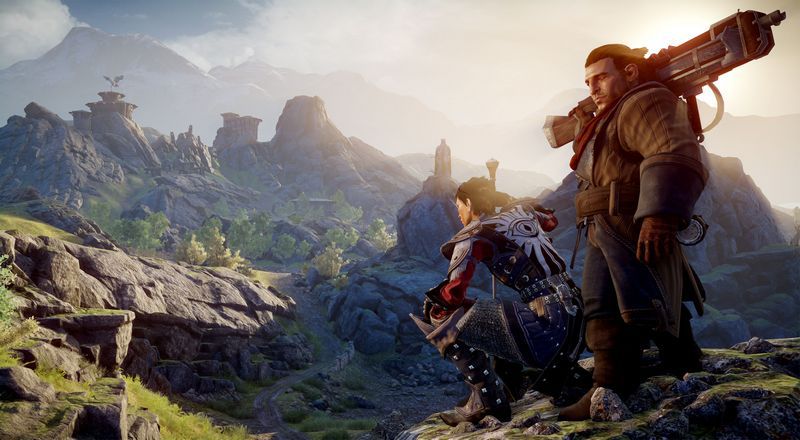
“If we returned all the characters, it would look like a parade,” says Geider. “We have already created two games, one extension and several DLC add-ons. We cannot just return them. We have already done something similar, and I do not think that it had a positive impact on our game. Therefore, now we are acting very carefully. ”
The risk of working with minor characters depends on their past. For some characters, for example, for Warrick, the risk is minimal. “This is a very popular character and he has a lot to develop,” says Chi. Warrick had very interesting behaviors in Dragon Age 2 and Inquisition. With other characters, things are not so simple. I wonder if the developers regret that they introduced some of the characters to the players?
“Daeewave?” Chi says. “Uh, yes,” agrees Geider. "Sometimes I want to write a letter to the past Dave and say: in the future, Dave will not like your decisions."
He continues: “I do not always regret my actions, but still sometimes thoughts like“ oh, if I do it differently ”appear, especially in situations where some cool hero can die. After that, the hero becomes the "character of Schrödinger", and it becomes more risky to include him in the following games. "
“For example, now we are slowly killing Alistair,” says Geider, “for today he is alive at about 10%.”

When we bring a character into such a state, we call him "quantum." Sometimes “quantums” we do not return or return with some restrictions. Very rarely, we decide to rewrite history - for example, as in the case of Leliana, who “died” in Origins, but still plays a major role in Inquisition.
“I created it,” says Laidlaw. “I thought that Leliana could bring a lot to the game, and I decided to return it. Other authors have joked about this for quite some time. ”
“Poor Cheryl had to write those parts of the plot in which there were, well, a lot of references to the previous parts of the game,” says Geider.
Cheryl Chi suggested the options: “She could die, could have a relationship with someone, and then die, she could become“ stronger. ”
“The relationship between Leliana and Morrigan is the relationship of the two“ quantums, ”says Geider. “We created antimatter.”
Nevertheless, there are some cases when a team deliberately creates difficulties in order to find out the possible tension in a situation. A good example of such situations is the mission “There is the Abyss”, where you need to decide who to sacrifice: Hawk or one of the three Gray Guards from previous games. I asked Mike Leydlow about the complexity of this choice.
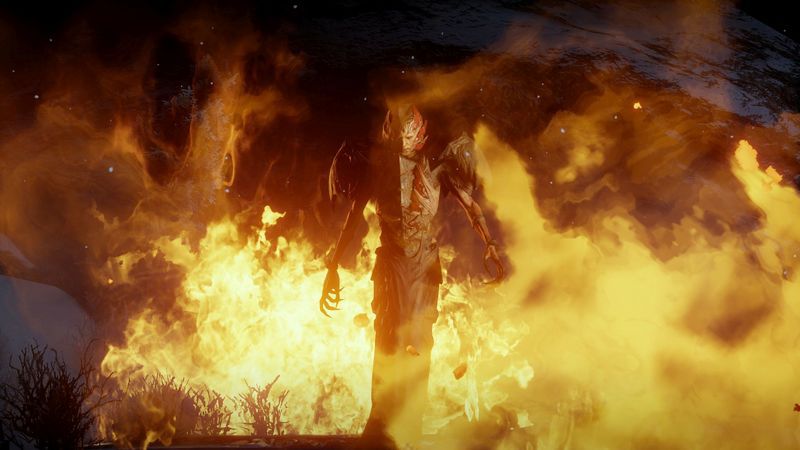
“In this game I tried to make at least a few situations where I could say:“ Wow, the new version is really very different from the previous ones. ” From a combination point of view, the presence of three characters who speak with another character, who can have three personalities, who can be a man or a woman, belong to one of the three classes is a kind of challenge, a difficult task, but it is very interesting to solve it. How often do you show a character from previous games? Personally, we have not done this before. ”
Here the difficulty was justified, because it offers only BioWare. I asked Laidlaw if they would like to move further in this direction and add other famous Gray Guards, such as Hawke’s brother and sister - Carver and Bethany, Anders or, and it would be just crazy, the Dragon Age: Origins player’s own Guardian-Commander .
“We thought about it,” he replies. “The guard adds tremendous complexity. I believe that we did very cunningly, endowing with a voice characters who did not initially speak. Many people really wanted to get a Guard, and I understood that. The problem is that this is a kind of personal affection, and I'm not sure that we could realize it in such a way as to please everyone. I feel a certain respect when I say: “No, your character is too special to be realized. If the character does not exist at all, the player will have much less negative emotions than if the character is realized, but not in the way the player wants. ”
This is how BioWare interacts with its most loyal fans: in the Origins part, players had so many tools for creating a character and his character that it is very difficult to include this character in the next series.
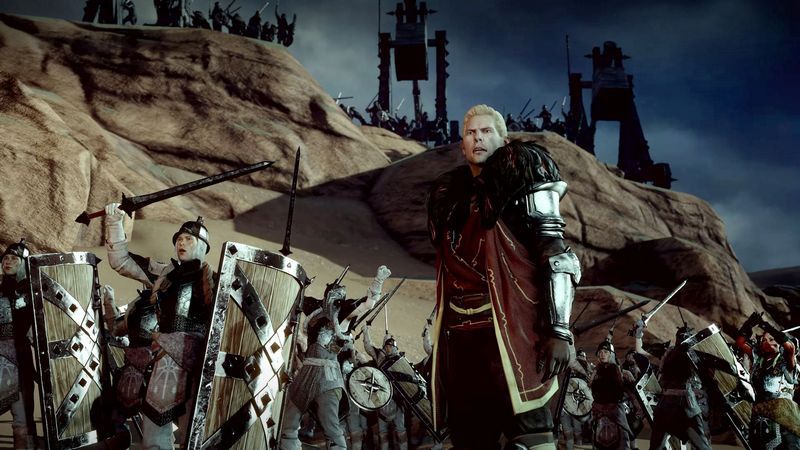
The development team has a strong desire to develop and change the plot. This is the reason for the plot turning when Solas’s companion is lost by the ancient elven god-deceiver Fen 'Harel, the Terrible Wolf. This is not the most significant move, and it will only matter to those players who read the Codex notes during three games, and Flemet's “death” in this scene closes the question that dragged on from the Origins series. Leydlow calls this move “an imitation of Marvel comics” and compares it with the appearance of Thanos at the end of the film “Avengers” - the authors open the curtain of the mystery of the future a little, but do not expect everyone to understand everything at once.
“I see it as a move that brings in some kind of peppercorn,” says Leidlow. “This plot replaces the plot with the mystery of Flemet, which many asked to somehow solve. And we decided to show a solution for this mystery, but immediately created a new riddle, since we do not want to finish the plot. ”
“This move seems to say“ expect more ”- to go the same way as in the films they say“ Agent 007 will definitely return, ”he continues. “We also seem to ask the question:“ Hey, is this interesting to you? ”There are a lot of different details in Dragon Age, and we demonstrate that we will be happy to help you figure it out. In a way, we are building a community. ”
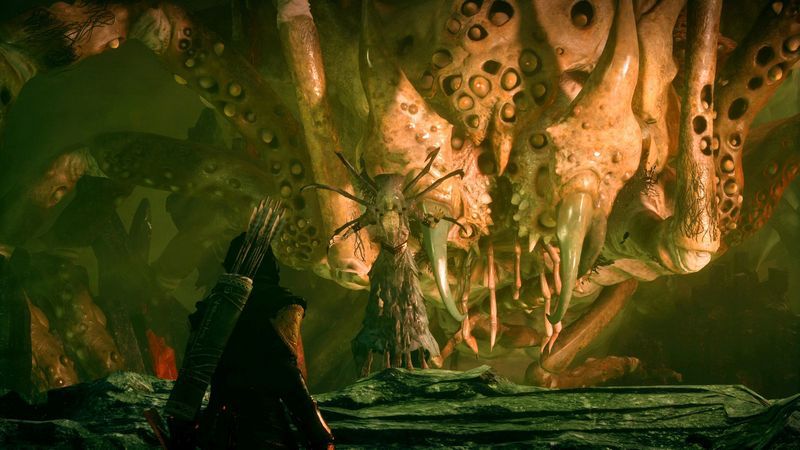
Thus, Solas starts the cycle again. If we say that the style of BioWare lies in their outstanding desire to spend a lot of time and effort to provide players with an interesting storyline over several games, it should be noted that the developers understand: there must be some “points” in the game by which newcomers - those who have not played the games of this studio since 2009 - would have the opportunity to join the community and feel equal. So BioWare attracts new fans.
Another fundamental component of the equation is that the BioWare team is a fan of their creativity. “We want to demonstrate that we are not just having fun in the process of creating the game and writing the plot, but also are in constant thought about“ how we can realize our ideas, which is still lacking. ” That’s how Patrick created Solas and all the little things that relate to him. ” This is noticeable throughout the game: from the frescoes of Solas in Skyhold to the statues of wolves, which you can see almost everywhere.
The reason that no one else does such RPGs that BioWare creates, it seems to me, is that no other studio combines all of these elements - giving back when creating every world accessible to players, a sense of responsibility for players, the connection of gaming systems and social problems, love, the desire to create deep complex tasks. You can’t name one thing, there are many such distinctive features, and it is they that provide the very “sensations” that you do not experience from any other game.
Before you read the article, we recommend that you complete this game.
To say that this article is a spoiler is to say nothing. This is the analysis of the game as a whole: from actions that affect the development of the plot, to the very, smallest details. Naturally, it’s worth playing Dragon Age: Inquisition: this game last year deservedly won the award in the category of Best Single Player and has one of the most exciting, unusual and fantastic stories that we saw in PC games.

First of all, I want to note why I added the translation to the hubs Development and Testing of games. This article contains a lot of theses that will help both developers and testers to look at the game plot and cases in a slightly different way. After all, BioWare really makes unique products.
Once again: do not read the article if you do not want to know the denouement of the plot.
Only a few developers can say that they fully understand the style of the game. Perhaps a couple of years ago you could say that this was just a “single shooter”, but now the title of “best single shooter” has deservedly passed to the brainchild of MachineGames. You could call Bethesda RPG, noting an interesting mixture of research, storytelling, and controlled freedom. However, most likely, you will understand what I mean if I say the words “BioWare RPG”. In the 17 years that led to the creation of Dragon Age: Inquisition last year, this Canadian studio has created the foundation for role-playing video games, which no other studio can boast.
Companion characters, plurality of choices and verified plots, the ability to import “save” files are an integral part of this structure. Philosophical and practical player orientation, flexible functionality allow BioWare to combine personality and fiction. In my opinion, this is what distinguishes the BioWare RPG from other RPGs from a technical point of view. You can also talk about the genre, and here it is quite relevant: sensations. In the 90s, id Software determined the sensations of shooters, the essence of which is crazy catharsis. Bethesda was drawn to change and travel after the lines of “See this mountain?” You can go there, ”and she turned them into a genre. BioWare have achieved something similar, but in this case, developers are more likely to click on the emotional rather than the physical.
If you understand what I mean when I say “BioWare RPG” - I think you experienced these “feelings”.

In RPG, unlike other games, you are guided both by your head and heart - in fact, I would say that this is the best of the possible definitions of the RPG genre in a world where there is a character development system everywhere. BioWare has done much more than other major developers in terms of studying the “heart” in this equation, and as a result of these efforts, it has received a huge number of loyal fans, whose work is sometimes very inspiring. And, let's be honest, even angry reviews sometimes give the very necessary impetus for development. One way or another, BioWare does not leave people indifferent.
For many years I have been a fan of BioWare. I kept waiting for other companies to start copying their style, directions, accuracy of character development - but this never happened. Only Obsidian and InXile can somehow compare with this studio in terms of flexibility in developing various RPG styles, but they are connected with BioWare by one common link - Black Isle Studios. Since I was given the opportunity to talk with the Dragon Age: Inquisition development team, what I wanted most to understand was how BioWare manages to maintain its distinctive style. I suspect that their characteristic features are in no way connected with technical limitations, but are more related to certain cultural values and priorities - this is where I will start.
We must always remember the player
Dragon Age script writer Cheryl Chi says about the creative process at BioWare. “When you say“ remember the player, ”you should try to put yourself in the shoes of different types of players,” adds Patrick Wicks, who was recently appointed lead writer for the Dragon Age series. “You need to not just think about gay players and women. You should consider such types as “advanced player”, “player who cares how the game ends”, “player who cares about the plot”. You must put yourself in the shoes of players with a different mentality. ”
Former lead author David Geider adds: “You also need to remember the balance of what we want to tell and what we can tell our fans. It is necessary to approach this very responsibly. Some developers may, sometimes unintentionally, narrow the potential audience of their game. This happens when you do not feel part of the game, when you get the feeling that "this game is not for you." We create products for a wide audience, and all we want to do is attract people to our game. ” From a conversation with the team of creators of Dragon Age, it becomes clear that this view is shared by all team members. Considering the situation from different perspectives is the very thing that connects the work of the team and the plot presented in the game itself.

“I’m always preoccupied with the thought that our“ fans ”exist somewhere, let's call them that, and they believe that we can’t concentrate and get involved in developing some serious fantastic moments that must be there,” says Geider. “Let me explain: we, as a team, at some point just sit down and say that the plot is not fully developed. How will a girl player take it? Or a gay player? Or a male player of a traditional orientation? How can people interpret the plot? After all, we are responsible for this. ”
The concept of social responsibility of game developers at the present time, unfortunately, is limited only to the political component. It should not be like that. Practical fact: the quality of the game is as important to the user as the technical component. You can see this by looking at how the Dragon Age development team reaches and exceeds its own standards: the Inqisition series is incredibly successful in terms of working out even the smallest nuances. The player can create his Inquisitor exactly as he wants, and his character will be one of many other heroes who will have a variety of worldviews, political beliefs and sexual preferences. This game, however, can be a problem for one type of player, whom Wicks calls the “finalists,” those who value the moment the game is complete. The open world of the Inquisition series is combined with numerous quests. It is necessary to “season” the games, and not to consider them simply as “something that needs to be passed”. PCG News Editor Phil Savage and I have been persuading our editor Samuel to leave the Inner Lands for two months and give up bear claw hunting for two months. ”
“To some extent, we have missed the interest in completing the action,” says Mike Laidlaw, creative director of the Dragon Age series. “For the“ finalists, ”it was important that you could destroy everything that you achieved. I look at it, and, you know, what I’m thinking about? That this will be a good lesson for us. ”
Discussing the issue of the “Prisoners of the Inner Lands”, Leydlow connects it with the problem that was earlier: playing the early RPGs from BioWare, the players got bored because they had to choose each option to continue the dialogue in order to be able to progress. “The most interesting thing happened when we switched to the communication wheel,” he says. “We observed two types of reactions: some players were upset, it seemed to them that the game was cut back. But there were other players who, looking at the “explore” option, thought: “Oh, cool, you can skip conversations!”.

BioWare Studio often shifts the responsibility for the development of the game to the player, and in this case the question of proportions arises: from the option “the game gives the player too few clear instructions for the development of the plot” to “the game dictates the player every step”. It is important to think over everything here. But the player should be able to ruin all his progress, if necessary for something. The team’s job is to find the right balance, and not to bring the player to the perfect result. “The option to“ explore ”can ruin the development of the plot,” says Geider, “therefore, basically, you need to stick to the plot and at the same time find the moments when using this option will be appropriate.”
For Inquisition, the Dragon Age development team has developed a new conversation mechanic in order to transmit information that is usually “buried” in “research”. The ability to display the wheel of communication in an open world allows the player to get additional information if he has such a desire, or completely get away from communication. It all depends on the player, and if the plot somehow changes, then this is the player’s decision. I think this is the flip side of BioWare's social responsibility: its desire to ask the player to “complete” what the plot intended, creating new tools that allow it to be implemented.
We always want to give the player the ability to react to everything that happened in the game
This is revealed in Inquisition by introducing a new set of emotional response options that appear after key events: now the player can not only be happy, angry or sad - he can be courageous, bewildered, upset, and so on. “We always want to give the player the ability to respond to everything that happened in the game,” says Geider. “In order for the player to realize what happened, as well as for the game to understand what happened.”
“In past games, we forced reaction or avoided the manifestation of emotions,” adds Wicks. “The reaction wheel allows you to select the desired reaction - anger, sadness, or, if the player does not attach any importance to this, you can choose something like“ spit. MOVING ON. ”

Gader continues: “We ask the player - do you have any emotions ... feelings, after something happened? And the player can switch his mood, choose any emotion: sadness, joy, anger, etc. ”
“Instead of saying something,” Wicks adds.
These answers do not greatly affect the plot outside the conversation, but that is not the point. The point is to let the player feel the result of what happened, even if they cannot change anything. This is a realistic way of including emotions in the game, as well as a certain distinction between a situation where it is possible to change something, and a situation in which nothing can be changed, you just need to accept it. But, of course, this line is much thinner than, say, its implementation in the Mass Effect series.
It seems to me that the complaints and petitions that followed the pessimistic initial completion of Mass Effect are nothing more than the refusal of some players to fulfill their part of the “deal”. Instead of recognizing BioWare’s right to show that bad things happen to good people, many fans have claimed they are eligible for a happy ending. I'm interested in the Dragon Age development team, do they think that they had the opportunity to confront the players and defend the possibility of some kind of tragedy in this case too? For example, all magicians and elves remain, but they are freed from all the prejudices that apply to them in the world of Thedas.
“I can’t speak for the rest of the authors, but I personally received negative reviews for everything where I limited the choice of players based on the player’s race or his past,” says Wicks. “I noticed a more positive reaction when I gave players of any race and any experience access to bonus content. So far we have not made a game where we wanted to show and give a sense of how people who are discriminated against feel. We wanted to avoid creating situations where, for example, people can do something, but elves do not. This, of course, would be realistic, but I don’t think that our players want this. ”

“Sometimes we do it,” interrupts Geider. “For example, characters who are not human beings cannot marry Alistair.”
“My starting point here is the choice you make at the end of the Origins part,” says Wicks. "Bonus - Become Queen Alistair."
“There is a difference between restricting a player’s choice and how the world responds to your decisions,” says Geider. “However, of course, there are situations where the Dragon Age team restricts players in order to increase tension.”
“Cheryl can tell you about this,” Vicks says, “she killed Hawke’s mother. It seemed like something terrible, but I will never launch a petition in order to save her. "
“We do this out of necessity,” Chi says.
“This is the fine line between the fact that you add drama to the plot and that you kick the player just because you can do it,” adds Geider. “I don’t know if we always did everything successfully, but this is part of the plot - you have to report bad news.”
I am fascinated by the respect and attention that exists between BioWare developers and players. Some bias occurred in ensuring the love claims of players during the transition from Dragon Age 2 to Dragon Age: Inquisition. This is another area of contention for fans of this game: the most ardent supporters of BioWare find deep meaning in this, while some users complain that the developer is trying to demonstrate progressive views at their expense. In Dragon Age 2, Sebastian's companion was available as a potential target for love for both female characters and men. In the Inquisition part, companions have more specific sexual preferences, which are formed on the basis of their life experience or views. In some ways, players are more limited, but these restrictions give the relationship more importance.
“I see characters in Dragon Age 2 as bisexual,” he says. “It seems to me that there is a tendency to hide bisexuality, to make sexuality“ invisible ”, and I don’t really like it. When we started creating the Inquisition part, I looked at the reviews on Dragon Age 2, and it turned out that everything was “too good”, a bit unrealistic. I do not want to abandon the idea of bisexuality or pansexuality, but still you can not create characters on the principle of "all for all." It doesn’t work like that. ”

“We had a desire to create characters that would be traditional and non-traditional, as well as bisexual,” continues Leidlow. “We wanted to make sure that it would be possible to create different love stories with a fresh plot, and not just“ I love you ”,“ I love you too ”- kissed. In addition, we wanted to move away from the predictable scenario in which we previously created our games. Now the plot is more vital. ”
Over time, when creating RPGs, BioWare moved away from "simulation" in the conventional sense. The developers began to create difficult social situations for the player, and they are so advanced in this that other developers and studios cannot even come close to BioWare in the level of detail of such situations. This desire for credibility is contrary to the expectations of some players (for example, in the case of a guy who on the forums requires other players to make love with his character), and also affects the budget of the game. To create all possible interactions with such detailing takes time, money, and also the desire to invest your own resources. This is what BioWare does when creating an RPG.
Every time a familiar and beloved character appears in new versions of the game, the studios seem to demonstrate a willingness to invest in it. Often the player’s enthusiasm for an episode is transferred to the expectation of something more in future versions. Ultimately, players are disappointed if they do not see all the familiar characters in the new games. The Inquisition series differs from previous versions of the game by a reduced number of significant heroes. The roles of Warrick, Morrigan, Leliana, Hawke, Alistair, and Logain are, of course, very important, but many other important characters have disappeared. This is not due to lack of time or lack of desire to please fans. The fact is that BioWare wants to develop the plot, and not just go with the flow.
“We think about it a lot,” says Laidlaw. “Who would we return? Well, we would return a character who was very significant and could bring something to the emotional component of the game, to its texture. We do not want to return the character just so that he is - this is not our way. "

“If we returned all the characters, it would look like a parade,” says Geider. “We have already created two games, one extension and several DLC add-ons. We cannot just return them. We have already done something similar, and I do not think that it had a positive impact on our game. Therefore, now we are acting very carefully. ”
The risk of working with minor characters depends on their past. For some characters, for example, for Warrick, the risk is minimal. “This is a very popular character and he has a lot to develop,” says Chi. Warrick had very interesting behaviors in Dragon Age 2 and Inquisition. With other characters, things are not so simple. I wonder if the developers regret that they introduced some of the characters to the players?
“Daeewave?” Chi says. “Uh, yes,” agrees Geider. "Sometimes I want to write a letter to the past Dave and say: in the future, Dave will not like your decisions."
He continues: “I do not always regret my actions, but still sometimes thoughts like“ oh, if I do it differently ”appear, especially in situations where some cool hero can die. After that, the hero becomes the "character of Schrödinger", and it becomes more risky to include him in the following games. "
“For example, now we are slowly killing Alistair,” says Geider, “for today he is alive at about 10%.”

When we bring a character into such a state, we call him "quantum." Sometimes “quantums” we do not return or return with some restrictions. Very rarely, we decide to rewrite history - for example, as in the case of Leliana, who “died” in Origins, but still plays a major role in Inquisition.
“I created it,” says Laidlaw. “I thought that Leliana could bring a lot to the game, and I decided to return it. Other authors have joked about this for quite some time. ”
“Poor Cheryl had to write those parts of the plot in which there were, well, a lot of references to the previous parts of the game,” says Geider.
Cheryl Chi suggested the options: “She could die, could have a relationship with someone, and then die, she could become“ stronger. ”
“The relationship between Leliana and Morrigan is the relationship of the two“ quantums, ”says Geider. “We created antimatter.”
Nevertheless, there are some cases when a team deliberately creates difficulties in order to find out the possible tension in a situation. A good example of such situations is the mission “There is the Abyss”, where you need to decide who to sacrifice: Hawk or one of the three Gray Guards from previous games. I asked Mike Leydlow about the complexity of this choice.

“In this game I tried to make at least a few situations where I could say:“ Wow, the new version is really very different from the previous ones. ” From a combination point of view, the presence of three characters who speak with another character, who can have three personalities, who can be a man or a woman, belong to one of the three classes is a kind of challenge, a difficult task, but it is very interesting to solve it. How often do you show a character from previous games? Personally, we have not done this before. ”
Here the difficulty was justified, because it offers only BioWare. I asked Laidlaw if they would like to move further in this direction and add other famous Gray Guards, such as Hawke’s brother and sister - Carver and Bethany, Anders or, and it would be just crazy, the Dragon Age: Origins player’s own Guardian-Commander .
Sentinel adds enormous complexity
“We thought about it,” he replies. “The guard adds tremendous complexity. I believe that we did very cunningly, endowing with a voice characters who did not initially speak. Many people really wanted to get a Guard, and I understood that. The problem is that this is a kind of personal affection, and I'm not sure that we could realize it in such a way as to please everyone. I feel a certain respect when I say: “No, your character is too special to be realized. If the character does not exist at all, the player will have much less negative emotions than if the character is realized, but not in the way the player wants. ”
This is how BioWare interacts with its most loyal fans: in the Origins part, players had so many tools for creating a character and his character that it is very difficult to include this character in the next series.

The development team has a strong desire to develop and change the plot. This is the reason for the plot turning when Solas’s companion is lost by the ancient elven god-deceiver Fen 'Harel, the Terrible Wolf. This is not the most significant move, and it will only matter to those players who read the Codex notes during three games, and Flemet's “death” in this scene closes the question that dragged on from the Origins series. Leydlow calls this move “an imitation of Marvel comics” and compares it with the appearance of Thanos at the end of the film “Avengers” - the authors open the curtain of the mystery of the future a little, but do not expect everyone to understand everything at once.
“I see it as a move that brings in some kind of peppercorn,” says Leidlow. “This plot replaces the plot with the mystery of Flemet, which many asked to somehow solve. And we decided to show a solution for this mystery, but immediately created a new riddle, since we do not want to finish the plot. ”
“This move seems to say“ expect more ”- to go the same way as in the films they say“ Agent 007 will definitely return, ”he continues. “We also seem to ask the question:“ Hey, is this interesting to you? ”There are a lot of different details in Dragon Age, and we demonstrate that we will be happy to help you figure it out. In a way, we are building a community. ”

Thus, Solas starts the cycle again. If we say that the style of BioWare lies in their outstanding desire to spend a lot of time and effort to provide players with an interesting storyline over several games, it should be noted that the developers understand: there must be some “points” in the game by which newcomers - those who have not played the games of this studio since 2009 - would have the opportunity to join the community and feel equal. So BioWare attracts new fans.
Another fundamental component of the equation is that the BioWare team is a fan of their creativity. “We want to demonstrate that we are not just having fun in the process of creating the game and writing the plot, but also are in constant thought about“ how we can realize our ideas, which is still lacking. ” That’s how Patrick created Solas and all the little things that relate to him. ” This is noticeable throughout the game: from the frescoes of Solas in Skyhold to the statues of wolves, which you can see almost everywhere.
The reason that no one else does such RPGs that BioWare creates, it seems to me, is that no other studio combines all of these elements - giving back when creating every world accessible to players, a sense of responsibility for players, the connection of gaming systems and social problems, love, the desire to create deep complex tasks. You can’t name one thing, there are many such distinctive features, and it is they that provide the very “sensations” that you do not experience from any other game.
